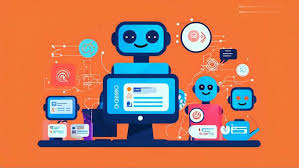The need for intelligent, responsive, and customized chatbots has increased across sectors as artificial intelligence continues to transform client interaction. The AI chatbot developer is a highly skilled expert who powers these intelligent digital assistants.
Understanding the function of an AI chatbot developer is essential, regardless of whether you’re a company executive seeking to recruit one or a budding tech worker hoping to break into this industry. This blog explains the duties of an AI chatbot developer, the fundamental knowledge and resources they employ, and the major market developments that will influence conversational AI in 2025.
Who Is an AI Chatbot Developer?
A software engineer or artificial intelligence specialist who designs, develops, and implements intelligent chat systems that mimic human speech is known as an AI chatbot developer. These experts build bots that comprehend user intent, react contextually, and get better with interaction by utilizing Natural Language Processing (NLP), Machine Learning (ML), and deep learning.
Provide chatbots for websites, mobile apps, social media, messaging platforms, and voice assistants, they frequently work together with product managers, UX designers, and data scientists.
What Does an AI Chatbot Developer Do?
1. Designing Conversational Flows
User journeys are mapped out by developers, who also produce dynamic, structured conversations that seem obvious and natural.
2. Building & Training NLP Models
They use platforms like Dialogflow, Rasa, or GPT APIs to build chatbots that can understand natural language, intent, and context.
3. Integrating Chatbots into Systems
To automate processes and facilitate transactional interactions, AI chatbot developers interface bots with third-party APIs, CMS systems, payment gateways, and CRMs.
4. Developing Backend Logic
They write scripts and server-side logic to ensure the chatbot can perform actions like updating databases, fetching records, or processing orders.
5. Testing & Optimization
To guarantee conversational correctness, reactivity, and scalability, chatbot developers put their systems through extensive testing. Additionally, they optimize bots using statistics and user input.
6. Monitoring & Maintenance
Developers keep an eye on the chatbot’s performance after launch and keep refining it to accommodate new user inputs, languages, and intents.
Key Skills Every AI Chatbot Developer Needs in 2025
To succeed in this evolving field, developers need a blend of technical, analytical, and creative skills:
1. Natural Language Processing (NLP)
Understanding how to process, interpret, and generate human language using tools like NLTK, spaCy, or Hugging Face Transformers.
2. Programming Languages
Proficiency in Python, JavaScript, or Node.js is essential for building logic and APIs.
3. Machine Learning & Deep Learning
Familiarity with AI models, neural networks, and training datasets to build smarter, learning-enabled bots.
4. Chatbot Frameworks
Experience with platforms such as:
- Google Dialogflow
- Microsoft Bot Framework
- Rasa
- IBM Watson Assistant
- Amazon Lex
5. Integration Skills
Knowledge of RESTful APIs, webhooks, and SDKs to connect the chatbot with external systems and services.
6. UX & Conversational Design
Understanding user behavior and designing intuitive conversational flows is critical to chatbot success.
7. Cloud & DevOps
Familiarity with cloud services (AWS, GCP, Azure) and deployment pipelines for scalable chatbot solutions.
Popular Tools Used by AI Chatbot Developers
Tool/Platform Purpose
Dialogflow CX Advanced NLP and intent management
Rasa Open-source NLP with full customization
Botpress Visual chatbot development
Microsoft Bot Framework Enterprise-grade bot creation
OpenAI API / GPT-4 Generative AI for natural conversations
Tidio / Intercom / Drift Quick integration for website chatbots
Postman Testing APIs used in chatbot workflows
TensorFlow / PyTorch Custom ML models for intent
Top 2025 Trends in AI Chatbot Development
1. Generative AI Integration
Large Language Models (LLMs) such as GPT-4 and GPT-5 are currently used by chatbots to provide intelligent problem-solving, innovative responses, and open-ended dialogues.
2. Voice-Enabled Chatbots
Voice interfaces are gaining popularity, requiring developers to work with speech-to-text (STT) and text-to-speech (TTS) APIs.
3. Emotionally Intelligent Bots
AI chatbots are evolving to recognize user sentiment and respond empathetically—enhancing customer experience.
4. Multilingual Bots
With global business expansion, multilingual chatbot support is now standard. Developers must build bots that handle language detection and translation natively.
5. Edge AI for Real-Time Responses
Deploying chatbots on edge devices or closer to the user to ensure real-time, secure, and low-latency responses.
6. Omnichannel Integration
The widespread use of chatbots across websites, mobile apps, Instagram, WhatsApp, Messenger, and smart home devices requires standardized development and deployment techniques.
7. AI Agents Over Static Bots
In 2025, static bots are being replaced by AI agents that can act autonomously, perform tasks, and learn continuously.
Career Outlook for AI Chatbot Developers
The demand for skilled AI chatbot developers continues to rise globally. Companies across healthcare, e-commerce, fintech, education, and customer service are hiring chatbot specialists to automate and personalize user engagement.
Average Salary (2025 Estimates):
- Entry-Level: $60,000 – $90,000/year
- Mid-Level: $90,000 – $130,000/year
- Senior/Lead: $130,000 – $180,000/year+
Freelancers and consultants are also thriving, especially those offering custom chatbot solutions using Generative AI.
Conclusion
In 2025, an AI chatbot developer will play a more important and diverse role than in the past. Developers are influencing the direction of digital communication through the creation of scalable automation systems and intelligent conversational interfaces.


